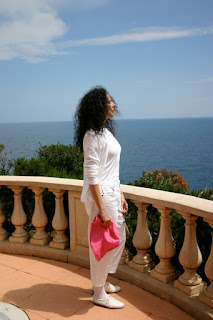Camille Aubray is the author of the new novel The Godmothers. She also has written the novel Cooking for Picasso. She lives in Connecticut and in the south of France.
Q: What inspired you to write your new novel, and is the family you write about based on a real-life family?
A: The fictional family in The Godmothers is not based on a real-life family.
I disagree with Tolstoy when he said that all happy families are alike. Even happy families have their unique and secret troubles, and that’s what interests me.
In this novel, I wanted to write about four women from totally different backgrounds, each with their own secrets, who become sisters-in-law. Those are my fictional characters.
But I also couldn’t resist writing about the outsized, real-life characters of that time period, especially the famous gangsters of the Five Families of New York.
Q: The book focuses on the 1930s, ‘40s, and ‘50s. What kind of research did you need to do to recreate that time period?
A: It’s just like visiting a foreign country—there are universal ways that all human beings behave, no matter the time and place; and then there are the things that are particular to a locale or an era.
So for The Godmothers I read all kinds of history and nonfiction. But I especially loved looking at the newspapers, magazines, films, art, and music of the time. They tell you a lot that you don’t get in history books!
Q: What intrigued you about the idea of godmothers, and what role do you see the four women playing in the lives of their family?
A: A godmother is very different from being a parent—who has total responsibility for the upbringing—and different from an indulgent and slightly subversive grandparent.
As the child grows up, the godmother can often step in as a wise counselor at the time of an impending marriage, or a mentor at the crossroads of career.
Think of the importance of the fairy godmother in children’s stories! She offers alternatives, so that you don’t give up when the world is dealing you a bad hand. That’s what my four godmothers—Filomena, Lucy, Amie and Petrina—try to do.
Q: Did you know how the novel would end before you started writing it, or did you make many changes along the way?
A: Yes, I knew how the novel would end.
But writing The Godmothers was like having a navigation system in a car: I knew what the destination was, and I’d mapped out the roads that could take me there, but once I started my journey, my instincts were like warning systems—Don’t go there, because there’s too much traffic that way; make this turn instead, because even if it curves and twists, it’ll get you where you want to go, in a better way.
Q: What are you working on now?
A: Two more historical novels! But I’ve learned to finish writing before I speak of them—just to make sure that it all makes it onto the printed page and doesn’t float away in the air of conversation.
Q: Anything else we should know?
A: Yes, I’m doing some exciting signings and virtual events this summer, which I will soon post on the events page of my website: camilleaubray.com. Also, I have great fun talking with book clubs, who can reach me at my website contact page.
--Interview with Deborah Kalb. Here's a previous Q&A with Camille Aubray.


No comments:
Post a Comment